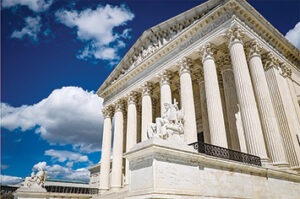Supreme Court curbs the right to strike
By the LABOR TRIBUNE and
PAI Union News Service
 Washington — The Supreme Court dealt a blow to unions’ right to strike on June 1, opening the door to frivolous lawsuits meant to deter workers and their unions from taking strike action to demand better wages and working conditions.
Washington — The Supreme Court dealt a blow to unions’ right to strike on June 1, opening the door to frivolous lawsuits meant to deter workers and their unions from taking strike action to demand better wages and working conditions.
By an 8-1 vote, the right-wing-dominated U.S. Supreme Court curbed workers’ right to strike by, in so many words, letting companies sue unions whenever they want in state courts for alleged “damage” strikers cause, even if the National Labor Relations Board is already investigating and handling the dispute. In the case, Glacier Northwest, a company in Washington state, sued Teamsters Local 174 seeking compensation for ready-mix concrete that went to waste amid a weeklong drivers’ strike in 2017.
The decision in Glacier Northwest v. Teamsters Local 174 was widely condemned by local Labor leaders.
 “This is another case of people in positions who don’t really know what it’s like to be out on the front lines tying our hands,” said Pat White, president of the St. Louis Labor Council.
“This is another case of people in positions who don’t really know what it’s like to be out on the front lines tying our hands,” said Pat White, president of the St. Louis Labor Council.
“One of our only ways of fighting back as a last ditch effort in trying to deal with some of these companies is a work stoppage. Strikes are hard for everyone involved, and the decision to strike is never taken lightly. This is just another way of trying to silence workers.”
 ‘TRYING TO LEGISLATE FROM THE BENCH’
‘TRYING TO LEGISLATE FROM THE BENCH’
“It was unfortunate that this ruling came out the way it did,” said Scot Luchtefeld, president of the Southwestern Illinois Central Labor Council. “It seems the Supreme Court is trying to legislate from the bench. Union Labor has been given the right to strike per the National Labor Relations Act. We have been given the right to strike for nearly 100 years. It is disheartening that the liberal justices joined with their opinions with the conservatives on this ruling. Once again union Labor takes it on the chin.
“It is great more and more groups are joining unions to have a bigger voice in their work careers,” Luchtefeld said. “It continues to prove how important it is to vote for our friends in state and federal legislatures that have our back with legislation and appointments that strengthen and keep Organized Labor viable in these times of constant struggle.”
 ‘RIGHT TO STRIKE IS SACROSANCT’
‘RIGHT TO STRIKE IS SACROSANCT’
“Our right to strike is sacrosanct, despite the U.S. Supreme Court’s misunderstanding and misapplication of the law,” said John Stiffler, executive secretary-treasurer of the St. Louis Building & Construction Trades Council. “It is imperative we continue to organize and elect union members to seats in government, because it is increasingly apparent we cannot rely only upon a judge’s opinion of what is right and wrong to protect our jobs and families.”
 VIOLATION OF RIGHTS
VIOLATION OF RIGHTS
Eric Oller, executive secretary-treasurer of the Southwestern Illinois Building & Construction Trades Council said “Allowing this to happen will be a violation of all Americans rights of freedom of speech. Working men and women deserve the right to protect their wages and working conditions.”
 ‘UNFOUNDED ALLEGATIONS’
‘UNFOUNDED ALLEGATIONS’
AFL-CIO President Liz Shuler was adamant the union did no wrong, and predicted the union will win when the case is remanded to the state court.
“The Supreme Court unnecessarily gave the employer another bite at the apple” by relying on “unfounded allegations in the employer’s complaint that the union intended to damage the cement trucks when it called the strike,”` Shuler said.
“We are confident that the state court will allow the National Labor Relations Board to decide if the strike was protected and the NLRB will find the union acted properly,” Shuler said. “Working people are standing up for our rights and fairness in the workplace at a rate not seen in generations. Striking for justice on the job is a critical part of the Labor Movement’s resurgence. The AFL-CIO and our more than 12.5 million members will continue to fight for workers, and we know that we will succeed.”
THE CASE
In the six-year-old case, Glacier, a cement company, sued Local 174 for striking and letting cement in trucks dry in Glacier’s yard, costing it $100,000 in damage to the trucks, plus lost business. Local 174 denied the charges, saying the workers ensured the cement truck drums were still spinning, keeping cement wet, when they left. It called Glacier’s suit retaliatory labor law-breaking.
The NLRB General Counsel agreed and took over the case, but Glacier went to Washington State Supreme Court to argue it could sue the local for damages. That court threw that case out, saying federal law pre-empted Glacier’s damages claim. The U.S. Supreme Court majority ruled otherwise.
“By reporting for duty and pretending as if they would deliver the concrete, the drivers prompted the creation of the perishable product,” the cement, Trump-named Justice Amy Coney Barrett wrote, swallowing the company’s line. “Then, they waited to walk off the job until the concrete was mixed and poured in the trucks. In so doing, they not only destroyed the concrete but also put Glacier’s trucks in harm’s way.”
Because they did so, in her lengthy retelling of the dispute, Glacier could sue the local for damages.
 The decision outraged Teamsters President Sean O’Brien said the ruling showed the court’s tilt towards the corporate class and the “billionaires …they socialize with at cocktail parties and who they owe their jobs to in the first place.” The justices “are not upholding the law,” he added.
The decision outraged Teamsters President Sean O’Brien said the ruling showed the court’s tilt towards the corporate class and the “billionaires …they socialize with at cocktail parties and who they owe their jobs to in the first place.” The justices “are not upholding the law,” he added.
“American workers must remember their right to strike has not been taken away. All workers, union and nonunion alike, will forever have the right to withhold their labor. The Teamsters will strike any employer, when necessary, no matter their size or the depth of their pockets,” he promised.
“Unions will never be broken by this court or any other. Today’s shameful ruling is simply one more reminder the people cannot rely on their government or their courts to protect them. They cannot rely on their employers. We must rely on each other.”
REVERSES PRECEDENT
The ruling reverses years of precedent and opens the floodgates to similar expensive lawsuits by firms against striking unions. AFA-CWA’s Nelson said the decision could lead to more militancy.
 Association of Flight Attendants-CWA Sarah Nelson predicted the ruling could lead to more militancy.
Association of Flight Attendants-CWA Sarah Nelson predicted the ruling could lead to more militancy.
“If the Supreme Court interferes with the already limited right to strike, it’s going to create even more instability in the workplace,” Nelson said. “They have to respect this human right or workers will take it into their own hands. There will simply be a breakdown in the law. We will see a lot more strikes.”
 FUNDAMENTAL TO OUR FREEDOM
FUNDAMENTAL TO OUR FREEDOM
“The right to strike is fundamental to our freedom as working people,” said Mary Kay Henry, president of Service Employees International Union (SEIU).
“Through striking and collective action, working people become more powerful than any boss or corporation. We win better wages and benefits and we make it impossible to ignore our demands to be respected, protected and paid.”



Leave a Reply